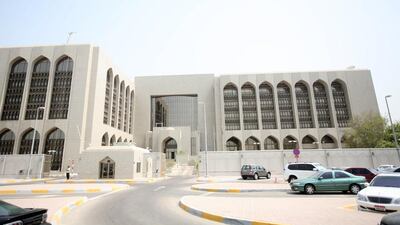The Central Bank of the UAE rolled out a comprehensive Dh100 billion economic stimulus package on Saturday to offset the impact of the coronavirus pandemic.
“Given that the World Health Organisation has declared Covid-19 virus as a global pandemic, the Central Bank of the UAE has adopted a number of measures in an effort to support the economy and protect consumers,” the regulator said.
"We will continue monitoring the situation very closely, and are prepared to take further steps, if necessary," it said.
The Targeted Economic Support Scheme includes Dh50bn from Central Bank funds through collateralised loans at zero cost to all banks operating in the UAE and Dh50bn funds freed up from banks’ capital buffers.
“The UAE banking system is adequately capitalised and banks maintain significant voluntary capital buffers in addition to the minimum prudential requirements,” the Central Bank said. “The draw-down of those voluntary buffers is not considered for the purposes of calculating the overall size of the Targeted Economic Support Scheme.”
The Central Bank said it "confirms continued and strong commitment" to maintain the peg of the UAE dirham to the US dollar. Foreign currency reserves stand at more than Dh405bn as of March 10 and are "are adequate to safeguard the stability of the national currency and achieve the CBUAE's objective to ensure monetary and financial stability in the state".
The regulator's latest measures come as the coronavirus outbreak intensifies outside China, the county of its origin. The virus has now evolved rapidly in Europe and the US, with more than 155,000 infections globally and more than 5,500 deaths. Though more than 75,000 patients have recovered.
The coronavirus, the biggest challenge to the global economy since the 2008 financial crisis, has disrupted trade, the travel industry and wiped nearly $17 trillion from stock markets worldwide. On March 12, financial markets across the world endured their worst day since black Monday in 1987 as fears about the effect of the pandemic continues to shake investor confidence.
Governments in many countries have unveiled stimulus packages aimed at protecting citizens from the impact of virus. The US Federal Reserve and several other central banks have cut interest rates to ensure there is ample liquidity, that credit markets do not stall and economies do not slide into a recession.
The International Monetary Fund and the World Bank have committed to extend $62bn in financial assistance and policy advice to countries in need.
The stimulus package by the Central Bank of the UAE aims to "facilitate provision of temporary relief from the payments of principal and interest on outstanding loans for all affected private sector companies and retail customers in the UAE".
The regulator ordered banks to use the funding "to grant temporary relief" to private sector corporate customers and retail clients for a period of up to six months, as "many retail and corporate customers have become exposed to the risk of temporary shortfall of their cash flows due the outbreak of Covid-19 pandemic, and the scheme is addressing the current situation by providing both a relief to customers and a zero cost funding to banks".
All banks will be allowed to tap into a maximum of 60 per cent of the capital conservation buffer, and additionally, banks "designated as systemically important" by the Central Bank will be able to use 100 per cent of their additional capital buffer for systemic importance.
The regulator is reducing the amount of capital banks have to hold for their loans to small and medium sized businesses by 15 to 25 per cent. This will increase available financing to SMEs.
The Central Bank will raise the loan-to-value ratios applicable to mortgage loans for first-time homebuyers by 5 percentage points.
"This will contribute to the affordability of housing without unduly increasing inherent risks," it said. First time buyers will benefit from being required to put up less of their own capital for their first real estate purchase.
The Central Bank is also revising the existing limit which sets maximum exposure that banks can have to the real estate sector. When the exposure reaches 20 per cent of the banks’ loan portfolio, banks will be allowed to increase it to 30 per cent, however they will be required to hold more capital.
Fees incurred by merchants associated with use of debit or credit cards by customers will be reduced. New Central Bank regulations will limit fees that banks can charge to their SME customers and restrict lenders from requiring larger minimum account balance than Dh10,000.
Under the news regulations lenders will be required to open accounts for SME customers within two days, contingent on the necessary documentation and that "the risk is acceptable in view of the anti-money laundering and combating the financing of terrorism obligations".
The Central Bank will issue guidelines on margin calls, that require lenders to request additional collateral within a reasonable time, before liquidating pledged stocks in a situation of a market downfall.
"This would reduce excessive market volatility and provide investors with increased flexibility to act in their best interest," it said.
For a period of six months starting March 15, the regulator is waiving all fees which it charges for the payment services provided to banks operating in the UAE through its payment and settlement systems.
On Thursday, Sheikh Hamdan bin Mohammed, Crown Prince of Dubai, also unveiled an economic stimulus package worth Dh1.5bn aimed at reducing the effects of the coronavirus and protecting businesses, with a focus on tourism, retail, external trade and logistics services.


